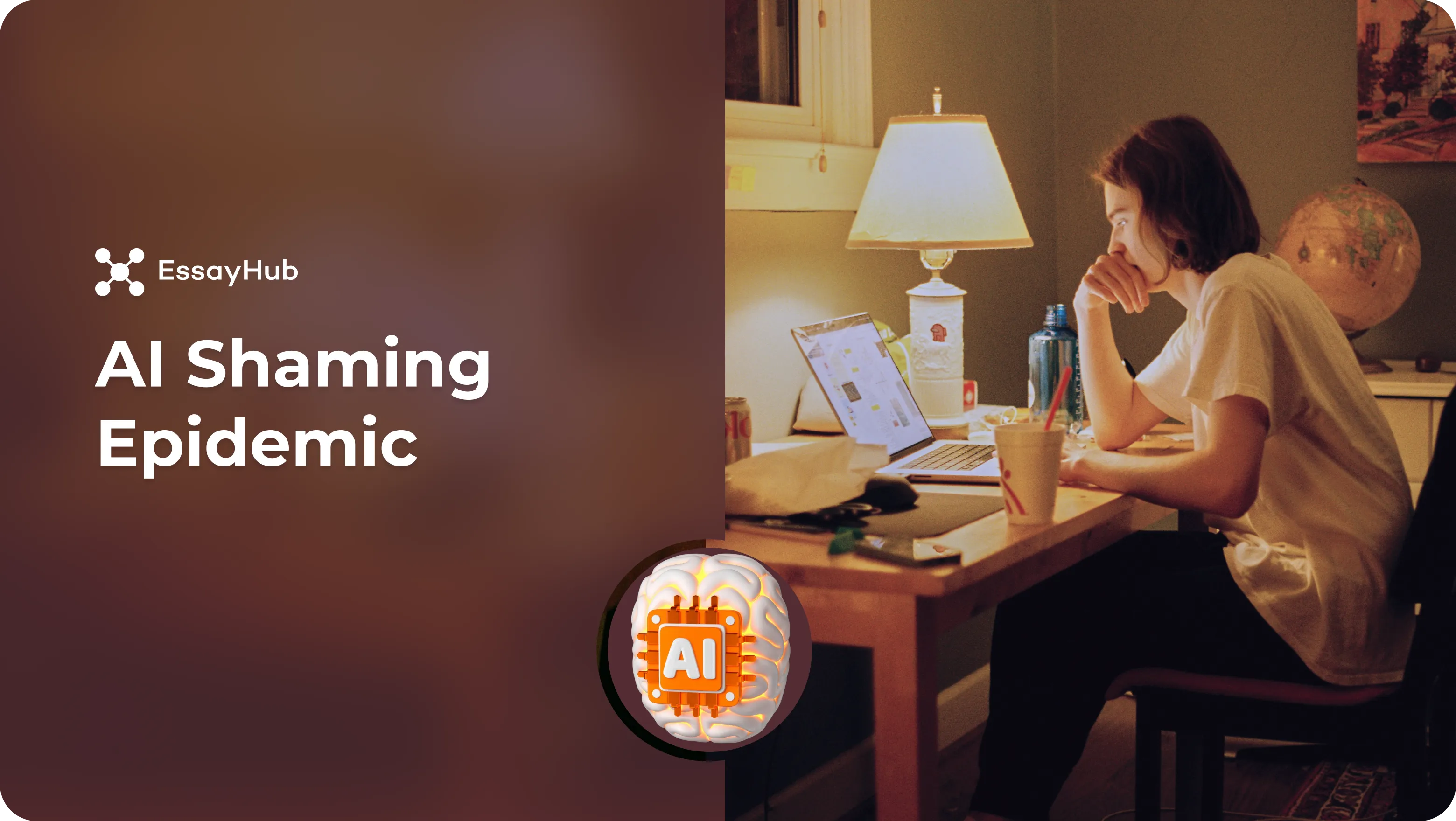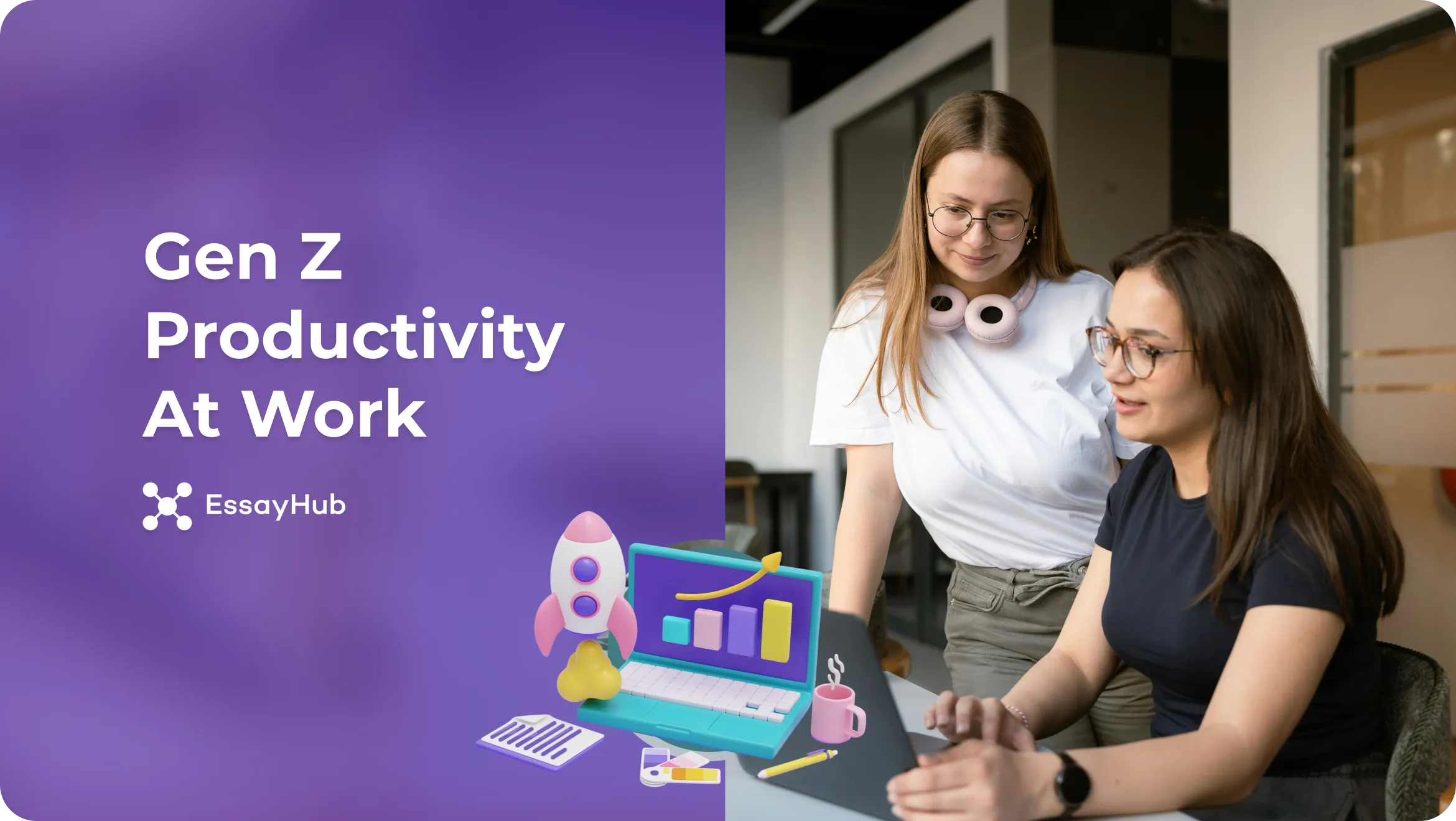Crafting a book report can feel like one of those assignments students write just to get it done. But who says it has to be that way? There are so many alternatives to book reports that let you present your understanding in creative, exciting ways. This article highlights 15 fun alternatives to the traditional book report that help students create projects they actually enjoy.
Here is a sneak peak:
- Character interview
- Book collage
- Podcast episode
- Alternative ending
- Time capsule
- Literary map
- Book trailer
- Letter to the author
These 8 ideas are just the start. There are even more options ahead that focus on critical thinking, independent reading, and letting students analyze books in creative ways.
And if you’re overwhelmed, EssayHub is here to help with any academic struggles. Whether it’s brainstorming ideas or a “write my book report” request, our experts are ready to step in and make your life easier.
Character Interview
Writers step into the role of a journalist as they meticulously compose a script for an interview with a pivotal character. The crafted questions aim to uncover the protagonist's motivations, emotions, and experiences, providing a nuanced and comprehensive understanding of their role within the narrative. By delving into the hero's psyche, this activity encourages a deeper exploration of the story's complexities.
To create a character interview, follow these steps:
- Choose a character that plays a significant role in the book.
- Brainstorm 5-10 meaningful questions about their actions, feelings, and choices.
- Write answers in the character's voice, staying true to their literary character’s personality and perspective.
- Include examples or quotes from the book to back up the character's responses.
- Present the interview in a creative format, such as a written Q&A or a recorded video.
Book Collage
A creative endeavor, this alternative requires writers to gather a myriad of images, words, and symbols that encapsulate various elements. These collected components are then thoughtfully arranged on a poster or digital platform, creating a visual collage that artfully represents the themes, settings, and main heroes within the narrative. This hands-on approach fosters artistic expression and lets you communicate your book interpretations in a visually compelling report.
Here’s how to create a book collage:
- Pick a theme or a character from the book as the focus of your collage.
- Search for images, quotes, and items that represent the elements of your book (use book covers, printouts, or drawings).
- Lay out your materials on paper, cardboard, or a digital design tool like Canva.
- Arrange them in a way that visually tells a story — group similar ideas or create a timeline.
- Add short captions or labels to explain why each piece is important to the book.
Podcast Episode
Engaging in the modern realm of multimedia, academicians produce a podcast episode wherein they not only succinctly summarize the plot but also delve into analytical discussions of its themes and share their personal perspectives. The dynamic format of a podcast allows for a lively exploration of the nuances, and you may choose to include interviews with peers or experts, enriching the discussion with diverse viewpoints. Through this medium, education seekers showcase their communication skills and offer an immersive listening experience for their audience.
To create a podcast episode:
- Choose a focus for your episode. This could be the book's themes, characters, or different perspectives.
- Write a rough script to keep your discussion organized, but don’t be afraid to ad-lib to keep it natural.
- Record your episode using a free app like Audacity or a smartphone recorder.
- If possible, invite a friend or classmate to join in for a discussion or mock interview.
- Edit your audio to remove mistakes and add music or sound effects for a professional touch.
- Share your podcast with your class or teacher as a creative way to present your insights.
Alternative Ending
Encouraging creativity and critical thinking, this activity prompts one to envision and articulate an alternative ending. Through a well-crafted narrative explaining their creative choices, report writers explore divergent possibilities, demonstrating a keen understanding of the book’s plot and personal dynamics. This exercise not only assesses comprehension but also challenges to contemplate the potential impact of altered resolutions on the overall narrative structure. Need assistance with crafting your book report? Consider utilizing a book report writing service for expert support in presenting your ideas effectively.
To create an alternative ending:
- Identify the turning point in the story where you want to diverge from the original ending.
- Think about how this change impacts the characters and themes of the book.
- Write the new ending in a tone and style that matches the rest of the book.
- Include details or callbacks from earlier in the story to make your ending feel natural and connected.
- Write a short explanation of your creative decisions and how this ending changes the story’s message or emotional impact.
Time Capsule
In this imaginative endeavor, learners curate a time capsule filled with a carefully selected array of book objects, letters, and items that symbolize key elements of the book. Each item is accompanied by an explanatory note detailing its significance within the story. This tactile and reflective exercise prompts us to think critically about the book's themes and protagonists while fostering a deeper connection with the narrative by creating a tangible, time-capsuled representation.
Here’s how to create a time capsule:
- Choose 5-10 objects that represent the most important moments, characters, or themes in the book. These can be physical items (like a key or photo) or ones you make yourself (like a drawing or mini letter).
- Write a brief explanation for each item — how it connects to the book and why it’s meaningful.
- Use a box, jar, or any container to assemble your capsule. Decorate it to reflect the book’s tone or cover design.
- Add an "opening date" for fun, imagining what future readers would learn about the book from your capsule.
- Present it to your class or teacher as if it’s been unearthed after years, explaining its significance with enthusiasm.
Literary Map
Tasking scholars with creating a detailed map of the source's setting, this alternative incorporates key locations and events. The map may include illustrations or descriptions, providing a visual representation that enhances comprehension of the story's spatial dynamics. Through this visual medium, pupils engage in a spatial exploration of the narrative, fostering a deeper connection to the book's world.
How to create a literary map:
- Start by listing all the important locations in the book: villages, landmarks, secret hideouts, or even imaginary places.
- Sketch out the basic layout of the world or setting. Don’t worry about being an artist; even simple shapes will do!
- Add key events to specific locations on the map, marking where major plot points happen.
- Use labels, short descriptions, or even quotes from the book to bring each spot to life.
- Add some personal flair: color it, add symbols, or include a legend that ties it all together.
Book Trailer
Leveraging multimedia, students craft a video trailer for the book, incorporating images, music, and text to capture the essence of the story. This dynamic approach not only hones their creativity but also requires a nuanced understanding of the book's core elements to convey its essence effectively. The result is a compelling trailer that serves as an enticing preview, motivating others to delve into the reading.
Steps to make this alternative book report:
- Choose a few moments from the book that highlight its main plot, themes, or characters.
- Write a short script to guide your trailer. Focus on creating intrigue, just like a movie trailer would.
- Gather visuals. These can be photos, drawings, or even video clips you film yourself.
- Add music or sound effects to match the mood of the story. Use free tools like iMovie, Canva, or CapCut for editing.
- End your trailer with a hook and leave your audience curious or excited to read the book.
Letter to the Author
Aspiring scholars express their thoughts and feelings about the book through a thoughtful letter addressed to the author. This written communication allows them to articulate their insights, ask questions, and provide feedback on the author's writing style or narrative choices. By engaging in this reflective process, pupils connect with the author personally, demonstrating a deeper understanding of the creative process.
Here’s how to write it:
- Start by introducing yourself and mentioning the book you’re writing about.
- Talk about what you loved or found interesting: specific scenes or even a twist you didn’t see coming.
- Ask a couple of questions about the book, like why they made certain decisions or what inspired a particular character.
- Share how the book made you feel or what you learned from it.
- Wrap it up with a thank-you for writing the story and let them know the impact it had on you.
Social Media Profile
Adopting a contemporary approach, you create a social media profile for a chosen protagonist from the book. Including details such as age, interests, and personality traits, this activity challenges learners to think critically about personal development. By writing posts and comments from the leading man's perspective, report authors delve into the hero's psyche, offering a unique and immersive exploration of their role in the narrative.
Here’s how to make it:
- Pick a character and decide which platform suits them best (Instagram, Twitter, TikTok, etc.).
- Create posts, captions, or tweets that match their personality and reflect events from the book.
- Include hashtags, comments, or even “reactions” from other characters to make it realistic.
- Add visuals like profile pictures, memes, or stories to show off their style.
- Highlight key moments from the book through their posts, keeping it authentic to the character.
Creative Diorama
This hands-on project involves writers creating a three-dimensional scene from the original using materials such as clay, paper, and found objects. The diorama serves as a tangible representation of key moments or themes from the story, requiring academicians to think spatially and visually. The tactile nature of the project engages multiple senses, fostering a deeper connection to the narrative and promoting a holistic understanding of the book's elements.
Here’s how to do it:
- Pick a scene that’s important to the story: something with action or characters.
- Use a shoebox, cardboard, or any container as your base.
- Gather materials like paper, clay, or small objects to build the setting and characters.
- Add small details like props or background elements to make the scene realistic.
- Write a short explanation of why you chose the scene and how it connects to the book.
Comic Strip
You are tasked with creating a comic strip that retells a specific scene or chapter from the book. This visual storytelling approach requires them to condense and convey key elements through illustrations and concise dialogue, promoting a creative interpretation of the source material.
Here’s how to make one:
- Pick a scene, chapter, or series of events you want to illustrate.
- Break the story into small moments or dialogues to fit into comic panels.
- Draw the panels by hand or use a digital tool like Canva or Pixton if drawing isn’t your thing.
- Add speech bubbles, captions, or sound effects (think “BAM!” or “WHAM!”) to bring the story to life.
- Make sure your comic shows the essence of the book and captures the personalities of the characters.
Debate Panel
In this interactive activity, trainees participate in a debate panel discussing various aspects of the book, such as themes, heroes, or moral dilemmas. They prepare arguments and counterarguments, engaging in critical thinking and persuasive communication as they defend their alternative viewpoints and challenge those of their peers.
Here’s how to set it up:
- Pick a major theme, conflict, or decision from the book to debate.
- Assign roles — either take on the persona of characters or argue different viewpoints.
- Write out points for and against the topic, using examples from the book to back them up.
- Hold the debate in class or record it as a video, making sure everyone gets a turn to speak.
- End with a summary of the most compelling points and how they connect to the story.
Author Biography
Educatees may choose to conduct research on the author's life and background, using the gathered information to craft a comprehensive biography. This exercise encourages report writers to consider how the author's personal experiences may have influenced their writing style, themes, or perspective, providing valuable insights into the context of the book's creation. Need assistance with crafting your book review? Consider utilizing book review writing services for expert support in presenting your insights effectively.
Here’s how to do it:
- Look up some background on the author: where they’re from, what inspired them, or how they started writing.
- Find out if any parts of the book are based on their own life or experiences.
- Include fun details, like their hobbies, struggles, or even weird facts that make them stand out.
- Make it personal — explain how knowing more about the author changes the way you see the story.
- Present it however you like: as a simple write-up, a timeline, or even a creative profile.
Literary Analysis
This traditional approach involves undergraduates crafting a formal essay that analyzes a specific aspect of the book, such as themes, symbols, or subplots. They support their arguments with evidence from the text, showcasing their ability to engage in close reading, critical analysis, and effective communication.
What to do:
- Pick one thing you want to focus on: a theme, a symbol, or how a character changes.
- Look for parts of the book that highlight what you picked. Jot down quotes or scenes that stand out.
- Break it down in your own words: What does it mean? Why is it important to the story?
- Connect it back to the book as a whole — how does it all fit together?
- Add your opinion — what makes it interesting or powerful?
Book Review Presentation
Learners create a multimedia presentation that serves as an alternative book report. They summarize the plot, evaluate the strengths and weaknesses of the original, and offer recommendations to potential readers. Incorporating quotes, excerpts, and visuals, this presentation provides a well-rounded assessment of the source's merits and engages the audience with a compelling and informative review. Need assistance with crafting your review? Give your report a finishing touch with a graduate school essay writing service.
Here’s how to put it together:
- Start with a quick summary — just enough to set the scene without giving away the whole plot.
- Share your honest opinion about the book. What worked? What didn’t?
- Highlight your favorite parts, whether it’s a character, a twist, or a theme that stuck with you.
- Add visuals like slides, props, or even drawings to make your points stand out.
- Wrap it up with your recommendation — who do you think should read this book and why?
Top Picks to Try
Here are 5 of the best alternatives from this list that are fun, creative, and perfect for showing off what you’ve learned:
- Character interview
- Book collage
- Podcast episode
- Alternative ending
- Book trailer
If you’re feeling stuck or buried in assignments, EssayHub’s essay service is here to help. With our expert support, you can handle your assignments without the headache.
And if you need tips on the basics, here’s a helpful guide on how to write a book report that covers everything you need to know.
- added more detailed explanation of alternatives.






